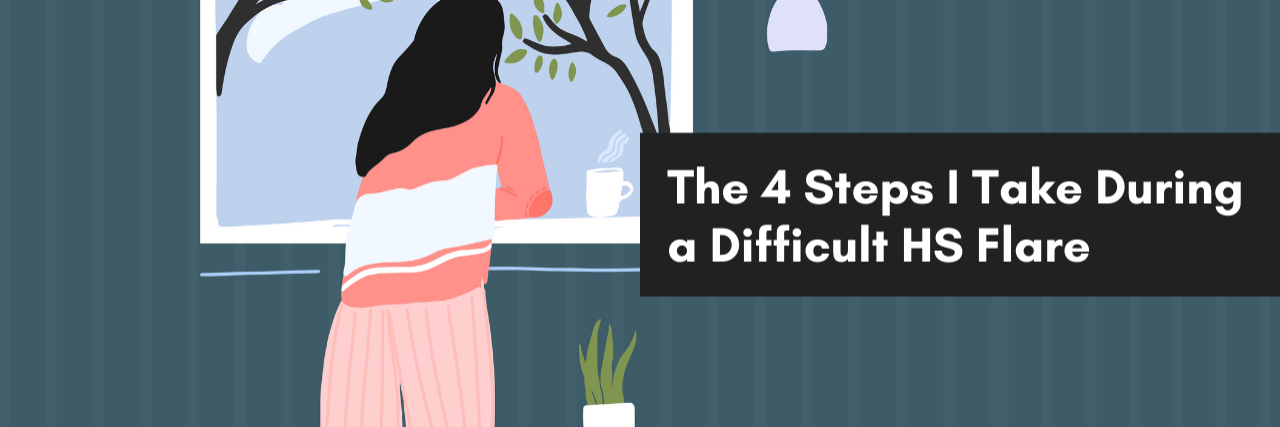One thing you will hear from many of us who live with hidradenitis suppurativa (HS) is that this disease is unpredictable. New lesions and flare-ups will appear out of nowhere. Every morning when I wake up, my first thought is, What is my HS going to look like today? On good days, I have manageable pain and minimal-to-no drainage. But on the bad days, my HS interferes with even the simplest tasks, like getting dressed or taking the dog outside. Depending on where the flare is, I may have limited mobility in my arms or intense pain if I try to walk around.
I’m so fortunate that I work from home and can make my own hours. In addition, I’m in graduate school, but I’ve been online since I started due to COVID-19. However, regardless of where work and school happen, a bad flare-up can leave me stuck in bed with no energy. So here’s how I get through the day.
1. I put on comfy, loose clothing and use dry shampoo if necessary.
My wardrobe mostly comprises loose, comfortable clothing, so these items are the first things I reach for when I wake up in intense pain. Sometimes I can’t even put on a bra, so I have a stack of loose shirts and sweatshirts that allow me to not wear one. Plus, bras are so 2020.
Some of my favorite stores to shop at include Old Navy, Target, Uniqlo and Nordstrom Rack. I gravitate toward sweatshirts, cotton leggings, joggers, cotton t-shirts or tank tops and dresses (if I’m not having a flare in my inner thighs).
Dry shampoo is my best friend because washing my hair is sometimes impossible. A shower usually helps with reducing the odor from the pus and drainage, but showering may not be happening either if I’m experiencing intense pain.
2. I have my kitchen stocked with easy foods, and I use delivery apps.
In pre-COVID times, I would reach out to a friend to walk my pup or run errands if there’s something I needed. These days I rely on food and grocery deliveries. I also try to have my kitchen stocked with simple foods, like soup and frozen microwaveable meals. It helps take the pressure off of cooking; on my worst days, I can’t even make a fried egg without breaking down in tears.
3. I focus on the present moment and reach out for support.
A difficult flare-up also affects me mentally. Even though I know the pain will subside at some point, I still worry that the bad days will last indefinitely. Will the pain ever stop? There’s also a constant fear that I will have to quit my job or school if I can’t stay on top of things. I’ve already had to make major career and lifestyle changes due my HS, so my anxiety isn’t irrational.
I’ve been trying to focus on the present and take it day by day. I know how hard it can be to listen to your healthy friends and family talk about future plans and goals. My therapist has helped me reach a point of acceptance with not being able to care for myself in the same way as my friends who don’t live with HS can.
Having to miss out on events and get-togethers is depressing. On my bad days, I need to cancel all social plans, even if it’s something as simple as someone coming over. I just don’t have the energy. HS doesn’t care if it’s your best friend’s birthday or a big work event.
To prepare for these days, I have talked to my friends about this disease and how it affects me. I also have a list of reasons ready in case a social event involves someone whom I don’t feel comfortable being open with. I hate lying but sometimes it’s just easier to do that than to try and justify my pain.
I have joined a couple of support groups on Facebook and connected with other HS warriors on Instagram. Having people to talk to who also live with this disease makes me feel less alone; they understand the unique challenges I face.
I’m in a place where most of the people in my life are aware of my HS. It’s taken me a long time to get here, but it’s so nice to have support when the pain gets to be too much.
4. I put my health first.
I spend a bit of time looking at my day and determining which meetings or projects I can put off until tomorrow. I’ve learned that living with HS means I’m going to have to push deadlines or not spend as much time on a paper or project as I had hoped. Sometimes the best I can do is just exist.
I used to force myself to push through the pain, even if it was unbearable. I’d plaster a smile on my face in front of people. I’d run to the bathroom during work breaks to cry or try to wipe away any drainage before it noticeably stains my shirt. I’d berate myself if I couldn’t put in a full day of work or school. I felt weak and incapable.
Now I’ve learned that the best thing to do during a difficult HS flare is to rest and take care of myself. I schedule time to nap. I end my day earlier. I eat regularly. And I listen to what my body needs. Because at the end of the day, our health matters more than anything else. Don’t let anyone tell you otherwise.

